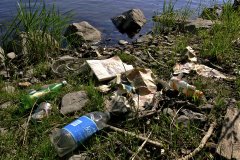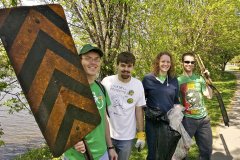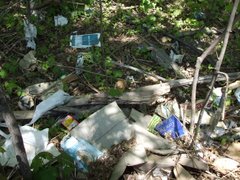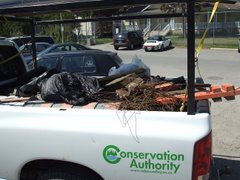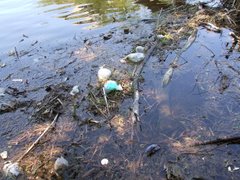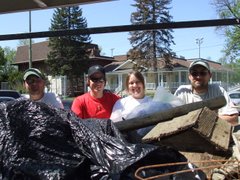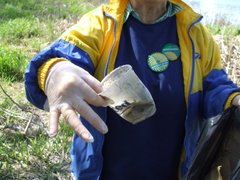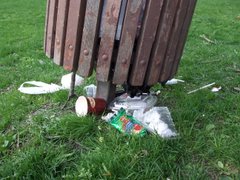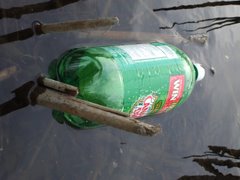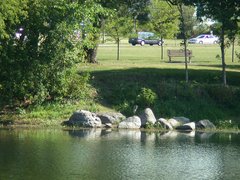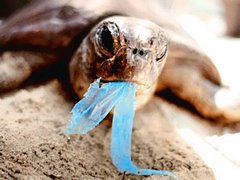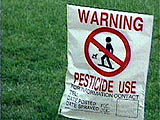
For those of you who want even more scientific reasons for cleaning up rivers such as the Rideau, here is some information about the breakdown of plastics in water.Plastic water bottles are made using (among other things) the element antimony. Antimony is toxic, and leaches into the water inside and outside the bottle over time. CBC Radio’s science program “Quirks and Quarks” aired a story about this on March 18, 2006 which you can listen to at http://cbc.ca/quirks/archives/05-06/mar18.html
Here’s another danger of plastic breakdown in water. Over time plastic bottles break down to release microscopic bits of plastic. These plastic bits are the size that can be ingested by aquatic animals. Though the effect of these tiny plastic bits on wildlife is unknown, it is probably not good. Quirks and Quarks aired a story about this on May 8, 2004 which you can listen to at http://www.cbc.ca/quirks/archives/03-04/may08.html.
To these microscopic dangers, add the well-known dangers of aquatic life getting tangled up in garbage and chemicals affecting our drinking water and fish we eat. Like Catherine points out, taking care of our environment literally does take care of ourselves. And of course there is the unscientific but perfectly legitimate reason for cleaning up the Rideau, that we would rather have a pretty environment than an ugly one.
Jay Fitzsimmons
4.13.2007
The Plastic Menace
Posted by Martin Canning, Urban Rideau Conservationists Coordinator at Friday, April 13, 2007 0 comments
"Those in power are poisoning children" By Mickey Z.

OpEdNews.com September 21, 2006 According to a study presented at the recent national meeting of the American Chemical Society, "remnants of Prozac are flushed from the body and travel in wastewater that reaches streams and rivers ... (and) cause female mussels to release their larvae before they're able to survive on their own." Tell this to the person sitting in the next cubicle and the typical response will likely be either indifference or bemusement. After all who gives a damn about a mussel? This got me thinking about Rachel Carson, who with the publication of her book, "Silent Spring," sounded a toxic wake-up call in 1962. "Can anyone believe it is possible to lay down such a barrage of poison on the surface of the earth without making it unfit for all life? " Carson asked 44 years ago. "They should not be called 'insecticides' but 'biocides.'" "Silent Spring" simultaneously alerted the public to the chemical dangers all around them while incurring the predictable wrath of corporate America. Indeed, an author can be certain about his or her impact when companies like Monsanto-the good folks who brought us Agent Orange-take aim. The use and abuse of pesticides, herbicides, and fungicides, Carson posited, were directly responsible for myriad health hazards not only for humans, but all life on the planet. "If the Bill of Rights contains no guarantee that a citizen shall be secure against lethal poisons distributed either by private individuals or by public officials," she wrote, "it is surely because our forefathers...could conceive of no such problem." "Silent Spring showed that people are not master of nature, but rather part of nature," says Carson's biographer, John Henricksson. "It was a revolutionary thought at the time. Today no one seriously questions its truth, but in 1962 it was a direct attack on the values and assumptions of a society." We could use some of that "revolutionary thought" stuff today as we now produce pesticides at a rate more than 13,000 times faster than we did in 1962. The Environmental Protection Agency-hardly a bulwark against corporate domination-considers 30 percent of all insecticides, 60 percent of all herbicides, and 90 percent of all fungicides to be carcinogenic, yet Americans spend about $7 billion on 21,000 different pesticide products each year. "Prior to World War II, annual worldwide use of pesticides ran right around zero," says author Derrick Jensen. "By now it's 500 billion tons, increasing every year." As a result, about 860 Americans suffer from pesticide poisoning every single day; that's almost 315,000 cases per year. Some of the many symptoms of pesticide poisoning include: altered personality, memory loss, difficulty concentrating, dizziness, headaches, hyperactivity in children, wheezing cough, liver damage, kidney damage, constipation/diarrhea, decreased sex drive, decreased sperm count, severe muscle weakness, and cancer. The worldwide death rate from pesticide poisonings is more than 200,000 per year. It's so, so easy to ignore or even mock the plight of mussel larvae but this is a canary in a coalmine situation. Those larvae are the mussel's children and what happens to them-in its own way-is happening to human children. "Let's be clear," Jensen concludes. "Those in power are poisoning children, stealing their physical and cognitive health: making them weak, sick, and stupid." No wonder the whole damn planet is on Prozac. Mickey Z. can be found on the Web at http://www.mickeyz.net.Authors Website: http://www.mickeyz.netAuthors Bio: Mickey Z. is the author of five books, most recently "50 American Revolutions You're Not Supposed to Know: Reclaiming American Patriotism" (Disinformation Books). He can be found on the Web at http://www.mickeyz.net.
Posted by Martin Canning, Urban Rideau Conservationists Coordinator at Friday, April 13, 2007 0 comments
Labels: Ottawa Medical Officer of Health wants pesticides banned
